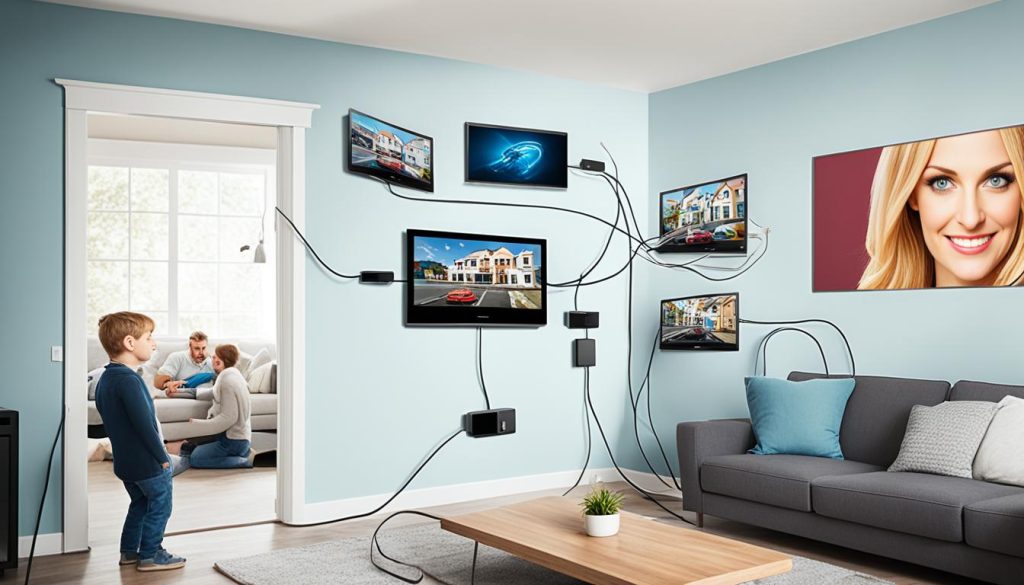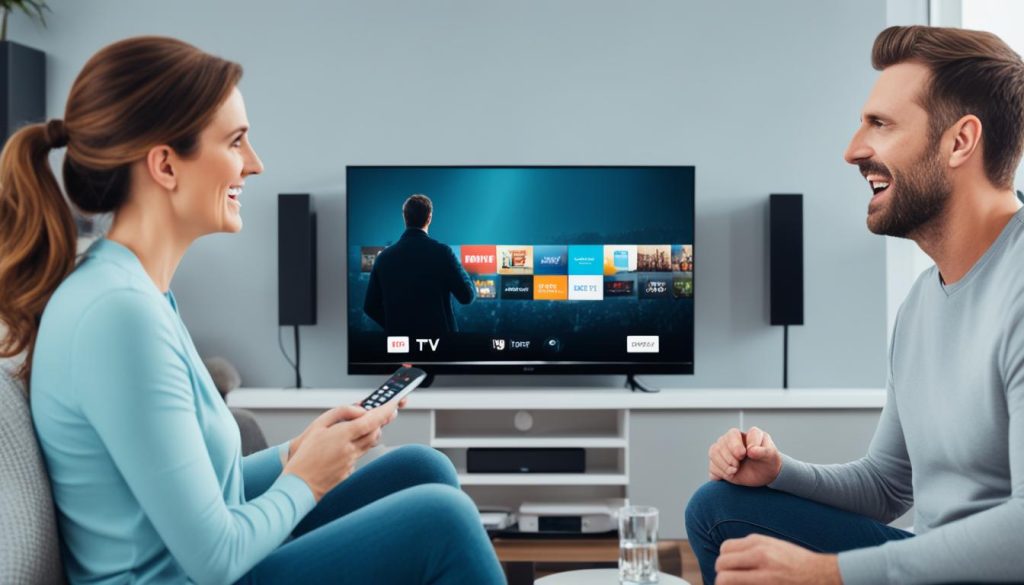The way we watch television has changed significantly over the years. Cable TV and IPTV are the two most common options for watching television programmes. Cable TV operates by transmitting programmes through broadcast networks to your home using light signals carried by fibre-coaxial networks, with a set-top box decoding these signals. In contrast, IPTV transforms shows, music, and live TV programmes into a compressed digital format, which is then transmitted through your home internet connection. Subscribers can select and play programmes on their TV or other connected devices within their home internet network, depending on their chosen channel package.
Key Takeaways
- Cable TV operates by transmitting programmes through broadcast networks, while IPTV transforms content into a compressed digital format and transmits it through the internet.
- IPTV offers more flexibility, as subscribers can select and play programmes on various devices within their home network.
- Cable TV has a longstanding presence, but it comes with the cost of a set-top box and monthly subscription fees.
- IPTV services present budget-friendly alternatives, with no hardware installation costs and a range of affordable subscription plans.
- IPTV’s accessibility is not limited by physical infrastructure, making it available wherever the internet is accessible.
Understanding Cable TV and IPTV
The way we watch television has evolved significantly over the years. Cable TV and IPTV are the two most common options for accessing television programmes today. To understand the differences between these two technologies, let’s delve deeper into how they operate.
What is Cable TV?
Cable television operates by transmitting programmes through broadcast networks to your home using light signals carried by fibre-coaxial networks. Once received, a set-top box decodes these signals, bringing broadcasted programmes to life on your TV screen. Cable TV has a longstanding presence, but it comes at a cost, with a set-top box and a monthly subscription fee being customary expenses.
Decoding IPTV
IPTV, or Internet Protocol Television, represents a paradigm shift in television delivery. It transforms shows, music, and live TV programmes into a compressed digital format, zipping them through your home internet connection. Subscribers can select and play programmes on their TV or other connected devices within their home internet network, depending on their chosen channel package. The process is simple: choose a channel with your IPTV provider, and your TV or computer retrieves the information from the provider’s server, establishing a link with its IP address. This link then transmits the necessary information to display the media content on your device.
Key Differences between IPTV and Cable TV
While both
and
provide access to a wide range of television content, there are several key differences that set them apart. Let’s explore these distinctions in more detail.
Cost Considerations
Cable TV has a longstanding presence, but it comes at a cost, with a set-top box and a monthly subscription fee being customary expenses. Conversely, IPTV services like Hulu TV, Sling TV, and YouTube TV present budget-friendly alternatives. IPTV doesn’t burden you with hardware installation costs, making it a pocket-friendly choice. When it comes to packages, IPTV offers more subscription plans than traditional cable TV, providing users with more choices when choosing an affordable subscription plan.
Accessibility Anywhere
Cable TV’s vast reach across the world requires a physical link to your home, posing challenges in remote areas. Cable TV requires the installation of long cable wires and signal boosters. In contrast, IPTV requires only an internet connection, making it accessible wherever the internet is available. All you need is an internet connection with decent speed and a device to watch content.
Diverse Channel Offerings
Cable TV boasts a diverse channel lineup, comprising local, premium, and international channels. However, specific channels may demand different subscription plans, leading to increased costs. IPTV services offer customisation, allowing you to tailor your channel lineup and providing multiple local and international channels with affordable plans.
Visual and Auditory Excellence
Cable TV delivers high-quality visuals and sound, but is susceptible to weather conditions. IPTV steps up the game with superior picture and sound quality, unaffected by external factors. Most IPTV services offer HD and 4K streaming, promising an exceptional viewing experience. However, for 4K quality, users should have a high-speed internet connection, preferably more than 40 mbps speed.
Adaptability and Convenience
IPTV stands out in terms of flexibility. Enjoy your favourite shows and movies on any internet-connected device—be it a smartphone, tablet, laptop, or smart TV. IPTV services often include on-demand content, granting you the freedom to watch your preferred shows and movies at your convenience.
Reliability Matters
Cable TV is a highly reliable option, backed by strong infrastructure and a well-established network. IPTV services, while innovative, may encounter buffering or interruptions due to slow internet and connectivity issues.

How does IPTV compare to cable TV?
When it comes to the world of television viewing, the debate between IPTV (Internet Protocol Television) and cable TV has been an ongoing discussion. Let’s delve into the key differences between these two options to help you make an informed decision.
Cost
Cable TV is usually more expensive than IPTV. With cable TV, you have to pay for a set-top box and a monthly subscription fee. On the other hand, IPTV services like Hulu TV, Sling TV, and YouTube TV offer affordable monthly subscription plans that are cheaper than cable TV. In addition, IPTV services do not require any hardware installation, which means that you can save money on equipment costs.
Availability
Cable TV is widely available in most areas, but it requires a physical connection to your home. This means that if you live in a remote area, you may not be able to access cable TV. On the other hand, IPTV only requires an internet connection, which means that it is available anywhere with internet access.
Channels
Cable TV offers a wide range of channels, including local channels, premium channels, and international channels. However, cable TV providers may require you to purchase different packages to access specific channels, which can be costly. On the other hand, IPTV services offer a variety of channels, including local and international channels, and you can customise your channel lineup to your liking.
Picture Quality
Cable TV provides high-quality picture and sound, but it may be affected by weather conditions and other external factors. IPTV, on the other hand, provides better picture and sound quality and is not affected by external factors. In addition, most IPTV services offer HD and 4K streaming, which provides an excellent viewing experience.
Flexibility
IPTV services are more flexible than cable TV. With IPTV, you can watch your favourite TV shows and movies on any device with an internet connection, including your smartphone, tablet, laptop, and smart TV. In addition, most IPTV services offer on-demand content, which allows you to watch your favourite shows and movies whenever you want.
Reliability
Cable TV is generally more reliable than IPTV. Cable TV providers have invested heavily in infrastructure and have established a strong network that delivers high-quality content to their customers. IPTV services, on the other hand, may experience buffering or interruptions due to internet connectivity issues.
Conclusion
In conclusion, both IPTV and cable TV offer their own unique advantages and disadvantages. While cable TV provides better reliability and a wider range of channels, IPTV boasts greater flexibility, affordability, and customisation options. The choice between IPTV and cable TV ultimately depends on an individual’s specific needs, preferences, and budget. For those seeking a comprehensive channel lineup and dependable service, cable TV may be the optimal solution. However, for those prioritising flexibility, cost-effectiveness, and the ability to tailor their viewing experience, IPTV emerges as the more appealing option.
As the landscape of television viewing continues to evolve, the competition between IPTV and cable TV will likely intensify. IPTV’s advantages in terms of internet TV advantages, streaming vs traditional TV, cord cutting comparison, and OTT services analysis may appeal to a growing number of consumers seeking alternatives to the traditional cable TV model. Simultaneously, cable TV providers will need to adapt and offer more innovative solutions to remain relevant in the ever-changing TV viewing evolution and future of television delivery.
Ultimately, the decision between IPTV and cable alternatives review comes down to personal preference and the specific needs of each household. By carefully weighing the IPTV vs cable factors, such as cost, availability, channel selection, picture quality, flexibility, and reliability, individuals can make an informed choice that best aligns with their television viewing preferences and financial constraints.
FAQ
How does IPTV compare to cable TV?
Cable TV operates by transmitting programmes through broadcast networks to your home using light signals carried by fibre-coaxial networks, with a set-top box decoding these signals. In contrast, IPTV transforms shows, music, and live TV programmes into a compressed digital format, which is then transmitted through your home internet connection. Subscribers can select and play programmes on their TV or other connected devices within their home internet network.
What is Cable TV?
Cable television operates by transmitting programmes through broadcast networks to your home using light signals carried by fibre-coaxial networks. Once received, a set-top box decodes these signals, bringing broadcasted programmes to life on your TV screen. Cable TV has a longstanding presence, but it comes at a cost, with a set-top box and a monthly subscription fee being customary expenses.
What is IPTV?
IPTV, or Internet Protocol Television, represents a paradigm shift. It transforms shows, music, and live TV programmes into a compressed digital format, zipping them through your home internet connection. Subscribers can select and play programmes on their TV or other connected devices within their home internet network, depending on their chosen channel package.
What are the key differences between IPTV and Cable TV?
Key differences include cost considerations, accessibility anywhere, diverse channel offerings, visual and auditory excellence, adaptability and convenience, and reliability.
How do IPTV and Cable TV compare in terms of cost?
Cable TV has a longstanding presence, but it comes at a cost, with a set-top box and a monthly subscription fee being customary expenses. Conversely, IPTV services like Hulu TV, Sling TV, and YouTube TV present budget-friendly alternatives. IPTV doesn’t burden you with hardware installation costs, making it a pocket-friendly choice.
How do IPTV and Cable TV compare in terms of accessibility?
Cable TV’s vast reach across the world requires a physical link to your home, posing challenges in remote areas. Cable TV requires the installation of long cable wires and signal boosters. In contrast, IPTV requires only an internet connection, making it accessible wherever the internet is available.
How do IPTV and Cable TV compare in terms of channel offerings?
Cable TV boasts a diverse channel lineup, comprising local, premium, and international channels. However, specific channels may demand different subscription plans, leading to increased costs. IPTV services offer customisation, allowing you to tailor your channel lineup and providing multiple local and international channels with affordable plans.
How do IPTV and Cable TV compare in terms of visual and audio quality?
Cable TV delivers high-quality visuals and sound, but is susceptible to weather conditions. IPTV steps up the game with superior picture and sound quality, unaffected by external factors. Most IPTV services offer HD and 4K streaming, promising an exceptional viewing experience.
How do IPTV and Cable TV compare in terms of flexibility?
IPTV stands out in terms of flexibility. Enjoy your favourite shows and movies on any internet-connected device—be it a smartphone, tablet, laptop, or smart TV. IPTV services often include on-demand content, granting you the freedom to watch your preferred shows and movies at your convenience.
How do IPTV and Cable TV compare in terms of reliability?
Cable TV is a highly reliable option, backed by strong infrastructure and a well-established network. IPTV services, while innovative, may encounter buffering or interruptions due to slow internet and connectivity issues.



